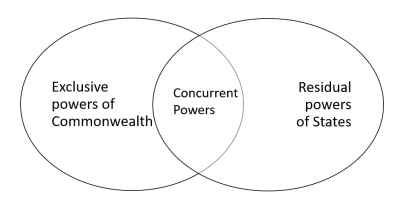Application of law to occupied foreign land
Conquest – forcible invasion – existing laws continue to apply
Cession – treaty over land – existing laws continue to apply
Settled – sparsely populated or inhabited by uncivilized population – laws of occupier apply
Australia was deemed to have been settled. Aboriginal people seen to be nomadic and have transient possession.
The land was terra nullius (belonging to no one). There was no recognition of customary law – so English law applied.
Mabo (No 2) established Native Title – a right derived from customary law, not common law, granting title if there was connection with the land
The Constitution
Constitutional Amendment
Manner and form restrictions
Double entrenchment
Constitutional Conventions
- Unwritten customs that are obeyed – e.g. Governor-General doesn’t have much power
Prerogative Powers
- Powers of the Crown – e.g. to declare war
Persona Designata
- Non-judicial functions can’t be assigned to courts, but can be assigned to judges
Judicial Review
- Courts have the power to invalidate laws which are inconsistent with the constitution
- However, the power is limited as they can only hear cases brought before them and don’t have any enforcement power (unlike the executive)
Coups
- Courts can recognise a new regime, even though their validity is based on the old regime
Voting and Elections
Commonwealth Electoral Act provides for:
- Compulsory voting
- Preferential voting
- Eligibility for election
Chapters of the Australian Constitution
Chapter I – Parliament | Exclusive powers – of Commonwealth Concurrent – shared Residual powers – of States |
Section 51 (xxix) – External Affairs power, including implementing treaties Section 51 (xxvi) – Races power, for the protection of a particular race Section 51 (vi) – Defence power, is a purpose-based not subject-matter power, so the law must be for achieving the defence of Australia and must be proportionate. Extends to post-war consequences and terrorism (including domestic terrorism). During peacetime, a significant connection with defence must be demonstrated. Section 51(i) – trade and commerce with other countries and among the states (freedom of interstate trade) Section 51(ii) – taxation Section 96 – Grants to States, often tied Melbourne Corporation Case – Cth should not be able to burden or impair States | |
Chapter II – Executive | |
Chapter III – Judicature | |
Chapter IV – Finance and Trade | |
Federal and State Constitutional Powers

Constitutional Amendment
- State constitutions can be amended, subject to manner and form restrictions which limit the way in which amendment can occur
- Double entrenchment – rule around amendment of the manner and form restriction
- Federal constitution requires a referendum to be changed
